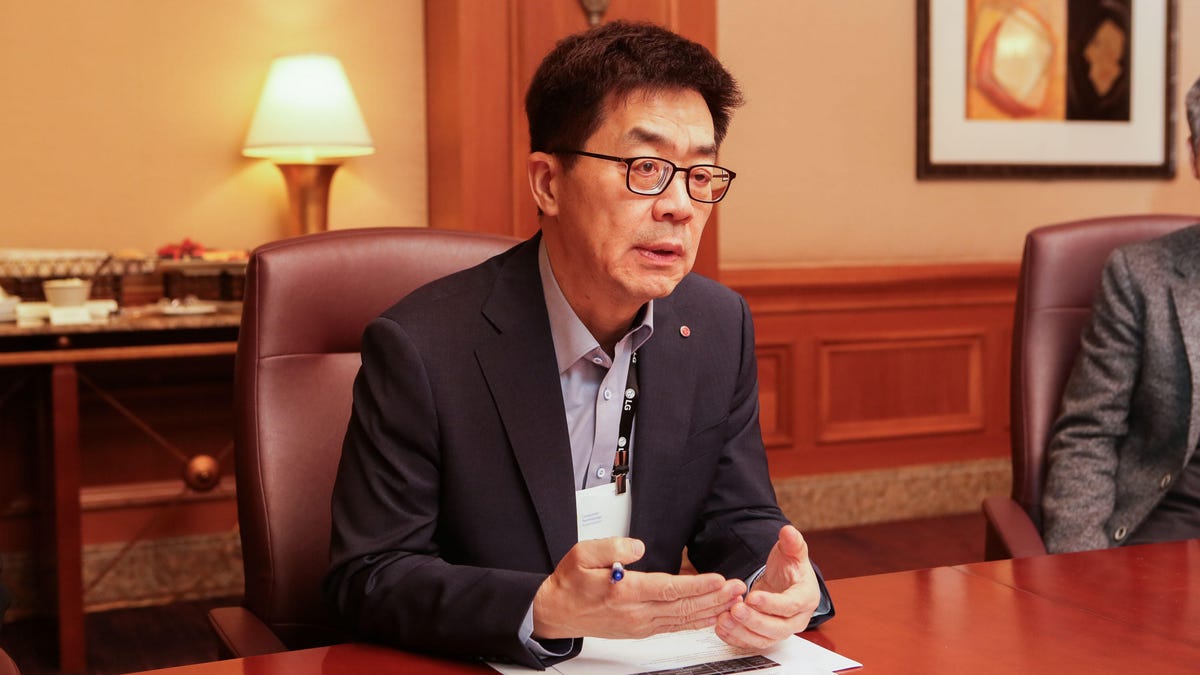LG: Our AI isn't just a marketing strategy
Artificial intelligence is a huge topic at CES, but LG's technology chief warns about hype without practical benefits.

LG Chief Technology Officer Il-pyung Park speaks to CNET in his first interview since getting the job.
LG spent nearly an hour at its CES press conference talking about how artificial intelligence will make its televisions, washers and refrigerators just a bit smarter.
But if consumers never notice that the AI is working, that's okay with new LG Electronics President and Chief Technology Officer Il-pyung Park.
"We don't want to use AI as a marketing strategy," Park said on Monday in his first interview since he became CTO. "If it works transparently and works really well, we will be happy and satisfied with that."
It's an unusual take given AI and voice assistants are a dominant theme at CES this year, and seemingly everyone is cramming Alexa or Google Assistant into their gadget or talking up their own AI efforts. But Park, who was promoted to CTO in November in a management shuffle after the company struggled with key products like its smartphones last year, needs to shake things up.
Still, talking up AI at CES this year isn't breaking the mold.
"In today's connected devices, AI is table stakes," said Avi Greengart, an analyst at Global Data.
The key benefit to AI is that it's supposed to be smart enough to learn your preferences and adjust accordingly. But Park's approach serves as an apt warning for both consumer electronic companies and consumers: Be careful what you hype up and make sure there's some practical benefit.
"You can talk about AI all day, but if the customer doesn't get any value out of it, it becomes useless," Park said.
Park talked about some of the benefits from ThinQ, its artificial platform, which includes building an air conditioner that knows your ideal temperature on specific times each day and adjusts things accordingly. There's also a smart washer that takes into account outside factors like weather, as well as your preferences, and creates an ideal wash-cycle time.
LG even introduced a home robot called CLOi, which had a case of stage fright at the event.
But Park said that LG's AI ambitions would remain open, which is why Google played such a heavy role in today's announcements. Scott Huffman, vice president of engineering for Google Assistant, showed up to talk about the search giant's relationship with LG, and how it's expanded from Android phones to appliances and televisions over the past year and a half.
Select LG televisions will come with Google Assistant built in, allowing you to call up Google via a microphone in the remote control.
"LG is coming from behind, but it is nice to see that LG recognizes the need to work with other platforms, and that it intends to integrate its own solutions across its vast array of consumer products," Greengart said.
But the Google lovefest today was markedly different than last year's CES, where Alexa played a role in its smart fridge and an Amazon executive got on stage.
Those televisions with Google Assistant will get an Alexa skill as well, but it's more limited than traditional integrations.
Park maintains that LG wants to be open and work with multiple partners, and opened the door to bringing both assistants when there's a demand for it. He doesn't believe having a TV with Google Assistant will dissuade consumers who have Amazon Echos with Alexa in their homes.
Peter Kim, who runs AI for LG Electronics, said the company chose to go with Google Assistant for the television because it offered a better service for news and weather updates. As a comparison, he said the company opted to go with Alexa for the refrigerator because there would be more of an intent to purchase things like groceries, and Alexa worked better there.
"Our aim was to provide what is best for customers," Park said.
CES 2018: Complete coverage of the world's biggest technology show from CNET.
The coolest new gadgets at CES 2018: Here are the best new announcements we've seen so far.

